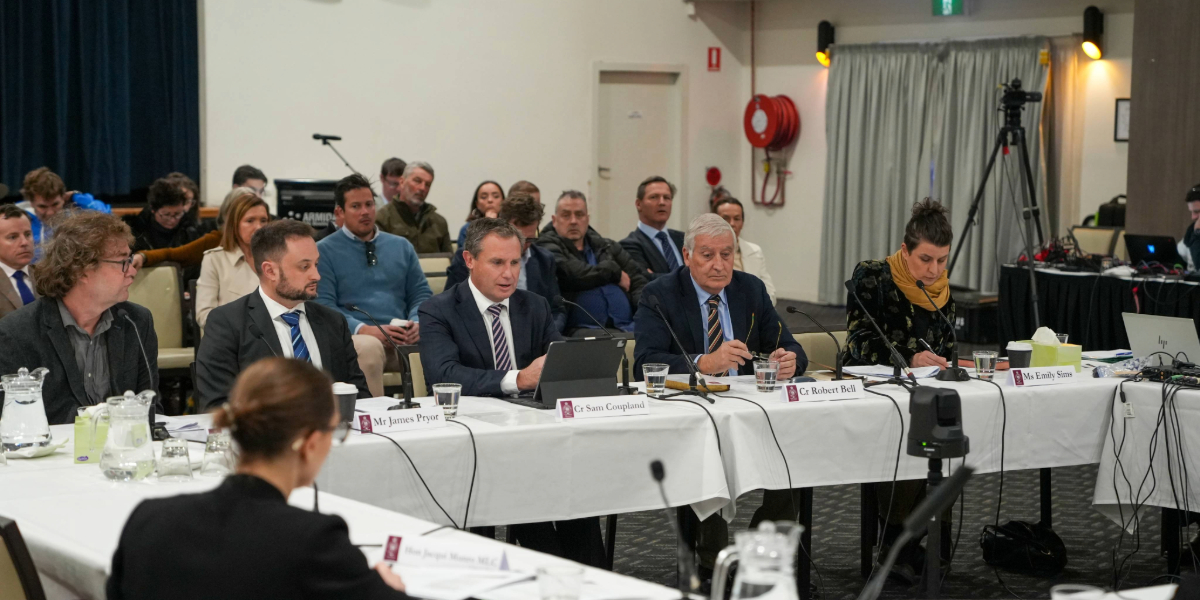The final hearing of the NSW Parliamentary Inquiry into the impacts of renewable energy developments in regional areas was held in Armidale yesterday with many of the usual suspects airing familiar frustrations about the state’s handling of the transition — and a lack of local benefit.
From the fallout of broken friendships in Walcha to warnings of economic collapse in Uralla, the inquiry heard repeated calls for change from New England representatives who argue their communities are bearing the cost without reaping the rewards.
Voice for Walcha’s Damien Timbs, who first rose to prominence as a champion for environmental sustainability and vocal opponent of the Winterbourne wind project, continued his evolution into a staunch critic of all large-scale renewable projects in his address to the hearing.
“We have friends no longer speaking to each other, social structures falling apart, and what was once a tight knit community in distress,” Timbs told the inquiry.
Walcha Mayor Eric Noakes was critical of the lack of funding and the strain put on Council staff, with core responsibilities suffering. Cr Noakes said the state had broken key promises made to Walcha in 2021, including commitments to maintain local roads and coordinate project proponents.
“We’re trying to work around projects that are and aren’t in the REZ on the same roads, and it’s just being left to us,” he said.
“We’re dealing with all of these people in silos, and it is very frustrating that the government hasn’t pulled this under one umbrella to make it easier.”
In Uralla, Mayor Robert Bell said that poorly managed development could “decimate” small communities already under pressure.
“We do need to look for economic development at the end of this. We can’t have 2000 people in your Uralla Shire, in a population of 6000, and then go back to nothing.”
Federal Member for New England Barnaby Joyce, a champion in the anti-renewables campaign, repeated his long-held view that large-scale projects should be sited somewhere else and agreements with developers should be transparent.
From Armidale, Mayor Sam Coupland warned the state’s focus on technical delivery had overlooked the wider potential of the New England Renewable Energy Zone (NEREZ) to drive real regional development.
“To date, the State Government has primarily approached the NEREZ as infrastructure corridors supporting metropolitan energy demands and the broader Net Zero transition,” Cr Coupland said.
“New England Renewable Energy Zone planning has so far failed to recognise fundamental issues currently impacting the region such as water availability, waste management, workforce accommodation, and current infrastructure capacity.”
Armidale Regional Council has developed its own community benefit sharing framework and negotiated Voluntary Planning Agreements with early developers, but says its efforts need stronger backing from the NSW Government.
“We support renewable energy, but there is an increasing burden that continues to fall on Council,” said Cr Coupland.
“The bottom line is: if we host it, we should benefit from it. Renewable energy is harvested here — this is our region’s resource.”
Valley Alliance President Tim White said the direction of the transition had lost its way.
“It’s gone in the complete wrong direction to where it should go. It’s gone away from our community, and it’s basically tried to go around our community rather than actually get to the heart of what we’re trying to say and what our feelings are,” Mr White said. “If this has an impact, that’d be great.”
The committee will now consider all submissions and testimony before preparing a final report.
Something going on in your part of the New England people should know about? Let us know by emailing newsdesk@netimes.com.au

